Wherein our boy does lots and lots of Acting™...
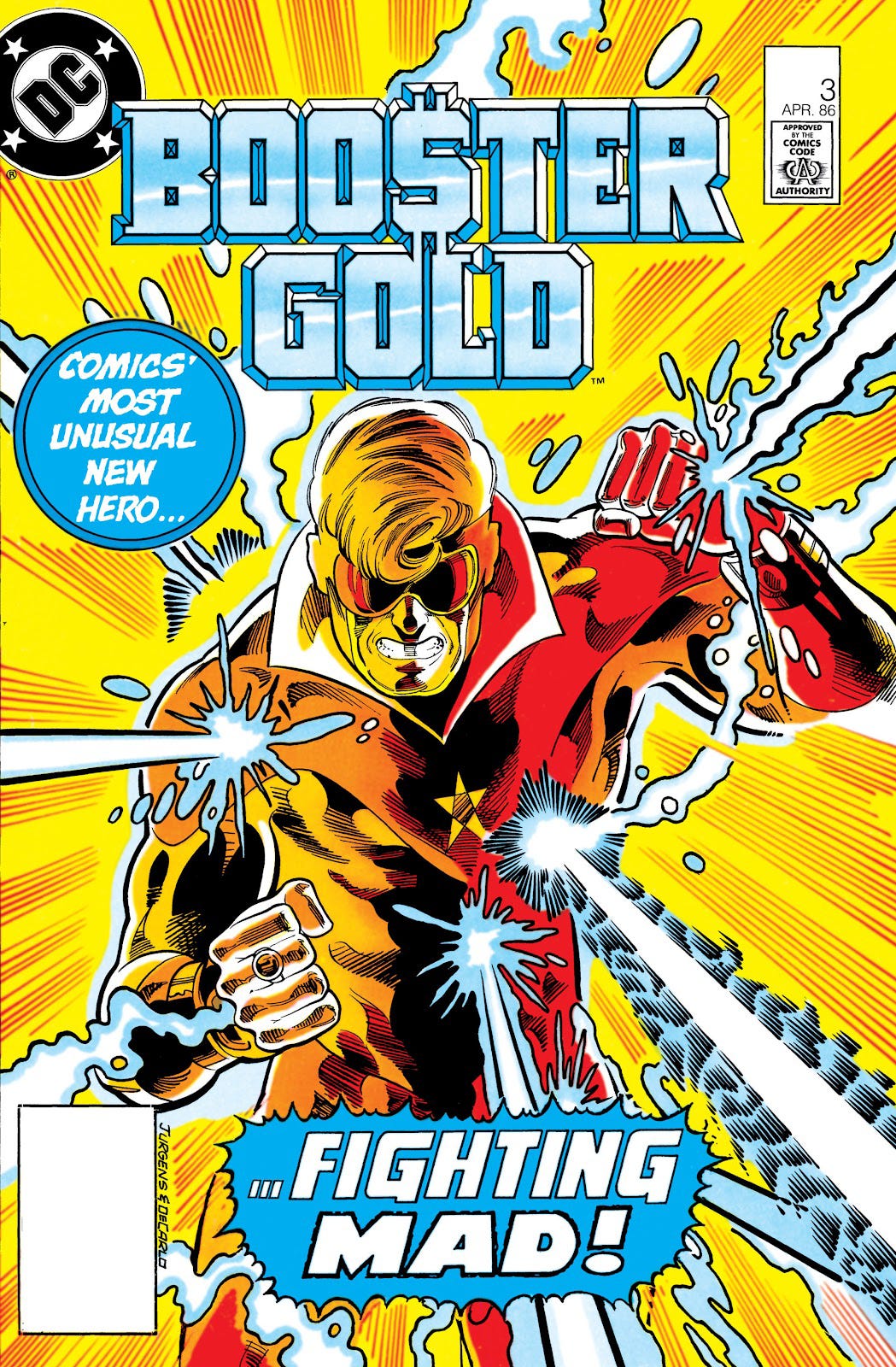
…though, admittedly, I’m pretty sure Booster only intended to be Acting™ about half the time and the rest is just an autonomic function with him.
Bulletpoints
This issue is good if you like:
- A young drama queen exercising every last iota of his acting skills or lack thereof
- A random and obscure DC heroine that was probably the only one DC would allow usage of here
- The only opportunity you’ll ever have to see Booster showing considerably worse fashion sense than Ted does— at least until we get to his post-Doomsday armor
- Which you can still blame on Ted, but even Ted didn’t like it
- Yet more of the Lifestyles of the Rich and Eighties
- Booster calling Skeets ‘Coach’ in the most adorable manner
- Seriously, I wish they’d kept that past this book, I love it
- More bondage. Lots of bondage. Booster spread-eagle.
- A shockingly high body count!
This issue sucks if you’re looking for:
- Genuinely good acting ¹
- A cast where the majority of the people are altruistic, compassionate and likeable
- Any scenes quite as good as a we had in last issue, alas, though we do get a couple decent ones anyway
The Tally So Far
Urge to Slap Booster Silly: 4
Urge to Coo Over Booster: 5
Give Skeets a Medal: 5
Give Trixie a Medal: 4
Booster in Bondage: 1
Urge to Wrap Booster in Soft Blankets: 2
Hopefully we won’t be adding any more categories. Entertaining as they all are!
The Actual Review
After last issue, this one would have to make a pretty serious lift to match it in quality, and I don’t think it makes it there. Nor is that a necessity, though: Not every issue of every book is going to be a masterpiece, and this one adequately keeps things moving just fine.
Anyway, it opens with Actual Drama Queen Booster Gold² howling the Big No, which is unfortunately a pretty comedic splash page for a moment set up so dramatically as a cliff-hanger.
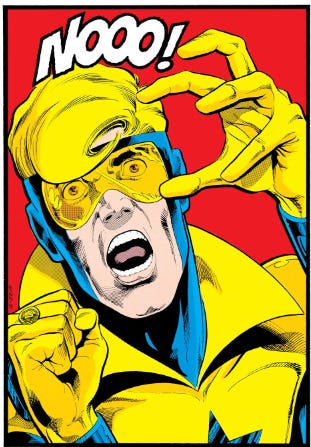
I just— look, sometimes you just don’t know what to say. But having been an artist for quite awhile myself (albeit not a comic artist), I have a hard time imagining Dan drawing this page straight-faced. Because personally, I would have been laughing so hard that this single page would have blown my deadline, just because I’d have to wander away in order to avoid wrecking my pencil work with my tears.
For the sake of my sanity, I choose to think Booster’s already suspecting that not everything is as it appears to be, with regards to Skeets getting blown up, and therefore his over-the-top acting here is a deliberate choice to sell it while he gathers more information. And if we’re being especially generous, we can also say it’s to act as a distraction for the various and sundry people watching, too.
And believe it or not— Booster actually is smart enough to think on the fly like that. Modern comics too often latch onto the notion that he’s somehow dumb, but that was never the case until writers started believing the lowest common denominator characterization of him, rather than actually reading and researching the character himself; hell, even during the Giffen/DeMatteis era, he wasn’t treated as if he was stupid. Goofy, sure; prone to bad luck and debatable decisions, yes. But not as if he was a dim-witted idiot.
Therefore, given how quickly he pivots from extraordinarily dramatic to thoughtful, there’s definitely credence that can be given to reading said drama as sincere or as a cover. What do you think?
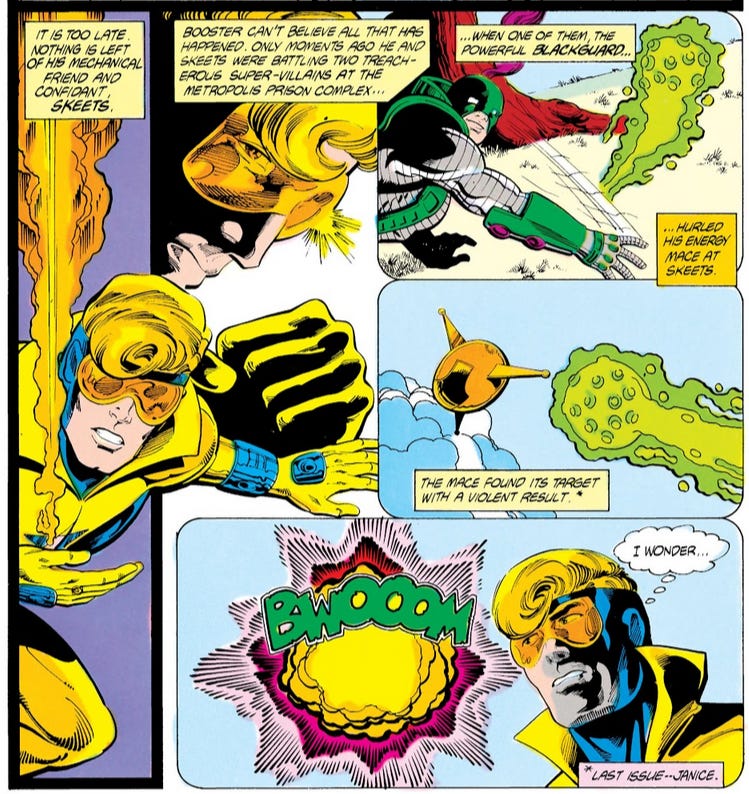
Meanwhile, down below, Dirk and just about everyone else manages to act pretty reprehensibly and not-a-little manipulative, which is one of the things in this book that continually fascinates me. Not only in comparison to Ted’s secondary cast — who certainly have their own little dramas and such, but who seem a lot less like snakes — but in relation to Booster himself.
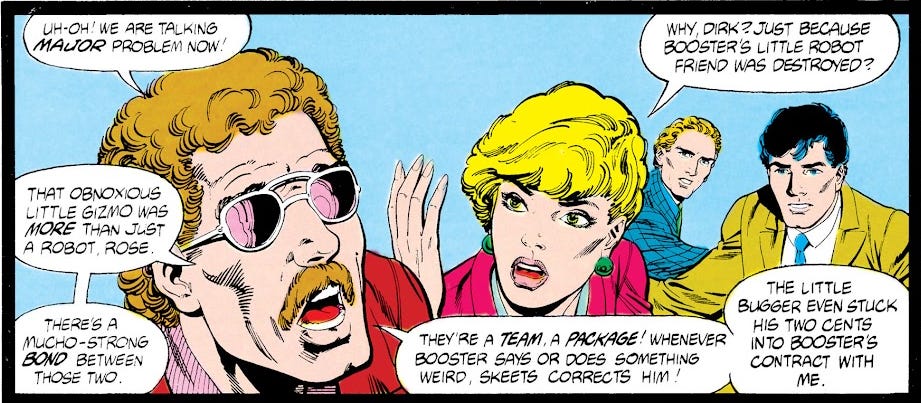
A Hopefully Quick Sociological Digression
One of the reasons why it’s particularly interesting to view Booster (as a character) through both the Watsonian and Doylist lenses is there’s usually something intriguing about both of those and how they sometimes tie together. Or about how what happens in-universe can serve as a commentary on what’s going on outside of it.
Most of the people who would end up reading these reviews of mine — which are some pretty deep dives — already know Booster’s backstory. In its earliest form, it was just: Highly promising college football hero gets greedy and decides to bet on his own games only to end up disgraced. As time went on, though, more and more interesting details got added in, most often by Dan himself, which completely change the framing of that story. The basic facts of it remain the same — Booster getting caught up in a gambling scheme and completely wrecking his own future — but the context and reasoning go from being somewhat simplistic (if unique) at the outset to some frankly brilliant character writing.
And all the more brilliant because of what it says about the creative process, in addition what layers it adds to Booster in-universe, too.
I know that very probably it wasn’t planned out in that fashion from the jump because any creative writer will tell you that stories often end up telling themselves, winging off in directions unexpected. Good characters essentially seem to write themselves. That doesn’t make the writing itself any less amazing, mind; this is still fiction, springing forth from the mind of an author, and therefore the author deserves credit for that excellence. But it does make for a fascinating look into the organic nature of character development, as well as what time can often lend to a story as it passes.
Anyone who knows me knows I’m a merciless critic when it comes to professional writers. I don’t mean cruel (and generally try not to be) and I always believe in giving credit where I feel it’s due (and try to never forget that my opinion is still only an opinion), but I’ve been in this game myself long enough to not lionize anyone. Part of that is because I firmly believe you shouldn’t ever put people on pedestals; that you should always bear in mind that these people are people, no better nor worse than you. That way, when shit like what went down with Neil Gaiman happens, you’re not devastated.
Believe me, I do have a point I’m coming to with this, so you can keep reading to get to it, or you can skip to the rest of the review.
So back on the train — crazy or not — I sometimes try to take into account the author’s life (Doylist) when analyzing the character’s life (Watsonian) because the push-pull influences are neat as hell. Not always, though, because I believe there’s merit in the concept of Death of the Author; that a story’s meaning cannot simply be attributed to only the author, but also to the reader interpreting it.
Walter (owner of the legitimately comprehensive and fantastic Boosterrific) and I have discussed Dan’s writing some and our own individual interpretations, and I’ve even corresponded once with Dan himself, so my own opinion ultimately is that while Dan’s a perfectly fine writer — meaning that he can tell a competent story³, has some good ideas and you’re not likely to find yourself wincing too often — his spark of actual genius really was in the creation of Booster himself, and moreso, specifically in this volume. (Not that Booster’s his only creation, mind, but I’d argue one of the best of them.)
In various interviews, Dan doesn’t exactly trash-talk his early work here, but he does make sure to include the caveat of how inexperienced he was and how much better he got over time. And as a writer, I can see that’s true. There’s a definite difference between early Vol. 1 and later Vol. 1. Dan’s technical skills improve with practice, just like the rest of us.
But again— there’s also a fundamental difference between skill and genius. His technical skills improved, but his genius — intentional or un — is on display in Booster himself, and how Booster interacts with the world, most evident here early on.
The evidence for this is in how Dan wrote Booster in Vol. 1 versus, say, when he took over the JLA. Dan does a better job in Vol. 1 by about three country miles. How he handles his own creation in JLA is just fundamentally bad at some points (specifically in making Booster a sexist asshole, which he never had been before); it’s almost as if he looked at how Giffen and DeMatteis wrote Booster (and well!) and then latched onto all the exact wrong things, some of which didn’t even exist prior, and pasted them over-top the lovely framework he put together himself, leaving both his writing and his character the poorer for it.
Dan might have been a more practiced writer in JLA, but I’d argue that — at least in terms of Booster as a character — he wasn’t actually a better one.
So, the point basically is:
- (Doylist) Dan displayed real, shining brilliance in his creation of Booster, both initially and with the building revisions to Booster’s backstory.
- (Doylist) The revisions of Booster’s backstory from ‘driven by greed’ (in ‘86) to ‘desperately poor kid gets a taste of something better than subsistence survival and wants more’ (‘87) to ‘desperately poor kid in a dire situation bets his entire future in order to save his mother and family, gets blackmailed by the mob, and then allegedly gets a taste of having money and wants more’ (‘89) in particular are absolutely fantastic from a character development standpoint PARTICULARLY because they’re doled out over time and actually build on each other.⁴
- (Doylist) Seriously, I could write you at least 10K words on the brilliance of that psychology for storytelling purposes, and it’s made no less good because it probably wasn’t all that intentional.
- (Watsonian) This also comes back to what I brought up last issue about the boy having some serious issues about vulnerability. Because once you get to the part where he got tangled up in all this trying to save his mother, in retrospect you realize that Booster himself must have given the harshest possible explanation for his behavior every time it came up prior to that. He had to have intentionally left out the parts of his story that would gain him at least sympathy from whomever was listening to it, which is polar opposite behavior from what one would expect from a young superhero looking to make it big. Booster doesn’t try to give himself a redemption arc. He basically paints himself as a villain. And that’s— incredibly damned interesting.
- (Watsonian) The only reason I can see why he would do this, when it’s actually sabotaging him as a heroic figure, is because he can’t stand the idea of anyone knowing something that intimate (and likely sore) about him — meaning that he got on the path to wrecking his life because he was living in poverty and trying to save his mother — because of course they’d use it against him. He doesn’t tell the Goldstar, Inc. team in his book until it’s about to be something they see for themselves, and even then, he still leaves more sympathetic parts out. And this is the same dude who didn’t tell anyone his given name for at least several months in canon. Even more intriguing, it doesn’t seem to occur to Booster to invent a less lousy backstory, which is another fascinating twist of psychology. Booster’s a pretty unreliable narrator, but not for any fundamental dishonesty; whenever he lies — at least about big stuff — it seems to be mostly done in self-defense.
- (Doylist AND Watsonian) The conclusion is: When you take all of these various factors in, you realize that Booster’s entire story — both backstory and in Vol. 1 here — is a hell of a tale of exploitation. And thus, the sociology (and psychology) in play.
The reason I’m saying all of that is because there are some things which are established as fact: Booster’s really fricken young here. Even in Vol. 1. Dan himself pointed out that Booster’s also pretty naïve, which certainly fits with his characterization, not only here, but also later in JLI. It dovetails neatly with those scenes I loved last issue, where Dirk is being controlling and Booster’s initial response is to try to appease and disarm the situation, and it’s only when pushed well past what most people on better footing would tolerate that he pushes back himself.
It also falls in line with the eighties in general, which was a mercenary time to be alive, at least here in the States. Reagan had dismantled a fair number of social safety nets, trickle-down bullshit was a thing, AIDS was killing people en masse, press secretaries were joking about gay plagues and everyone seemed to mostly be out for themselves.
While you can’t remove from Booster the fact that he was partially complicit in his own exploitation, you can also acknowledge that said exploitation was not only there, but a real thing: Everyone wants a piece of this kid. Everyone wants to figure out how to market him, how to make money off of him, how to manipulate him, and Booster trying to make money off of himself — which is why I said his evolving backstory is so damn genius — doesn’t actually make that any less reprehensible. Out of all of them, his motivations are the most understandable.
Even if you buy his own harsh self-view of those motivations — that he got hooked on the money — you gotta ask: Who the hell wouldn’t? I mean, I grew up essentially that exact same kind of poor he did. If suddenly handed a seemingly guaranteed way to get away from that, contingent on cheating a system dead set on using me anyway, why the hell wouldn’t I? Especially as a teenager.
(That’s rhetorical: I actually kind of did, but not in the same ways. Another story for another day.)
So, tying it all together…! Thanks to his backstory, we know he was already primed for exploitation, too. Because, as we find out later, everyone’s betting on him, everyone has a stake in this kid, everyone wants a piece of him. Add in that college football is rife with using athletes up even today (I should know, I worked right next to a university football locker room and was heavily involved with every game), and young men are beating their bodies (and brains) to hell and back for an education or a shot at the pros, and suddenly, everything about Booster not only makes infinitely more sense, it also makes your heart ache for him.
So many of his experiences as a young adult are about his value to others as something more than as someone. Even, ostensibly, with the people who are nearest to him and should care about him as a person, with the exception of his family in his era, and Skeets and (partially, not totally, as we’ll get into later) Trixie. It’s little wonder he’s such a hot mess, one who has a deeply dysfunctional relationship with his own self-worth.
It doesn’t excuse his bad decisions, or those moments he acts like an ass and I wanna slap him silly, but it does explain them.
So, when you have people on the ground freaking out because his ‘bot got wrecked, not because it’ll hurt him but because it might either raise or ruin his earning potential, the sheer genius of how it all comes together in both the Doylist and Watsonian senses means Dan deserves a standing ovation, whether he intended to earn one or not.
And now back to your (ir)regularly scheduled review.
The Actual Review (Again)
After we establish that most of the people surrounding Booster are vulture-esque in a number of ways — which Booster himself, despite his suspicions, obviously finds unsettling and gross — we skip over to Mindancer (still missing the necessary second D… ← Jesus, I didn’t think you’d need this in this review, but here: 🗞️) and Blackguard, who has not been… disciplined yet (🗞️🗞️), but seems to be walking into a situation where that might swiftly change.
Blackguard brags it up to The Director about how he just pulverized Skeets, which The Director — god, that name — is instantly displeased about, bringing us to this exceptionally yellow panel:
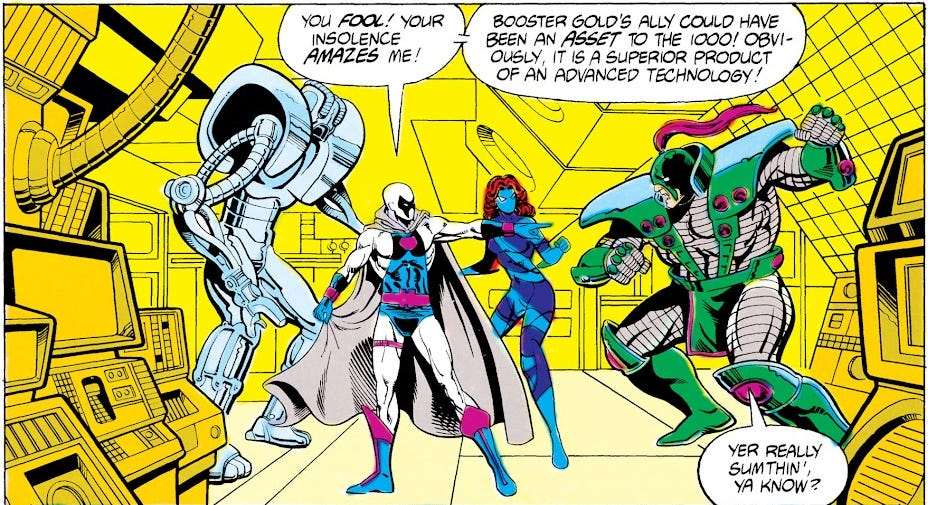
The Director, with his inexplicable thigh strap, takes control of the giant hulking android and has it attack Blackguard, which means perhaps we’ll finally get that aforementioned… discipline. It doesn’t actually take long at all for said android to knock Blackguard out; after Mindancer and The Director admire themselves for a few, we go visit some lingerie.
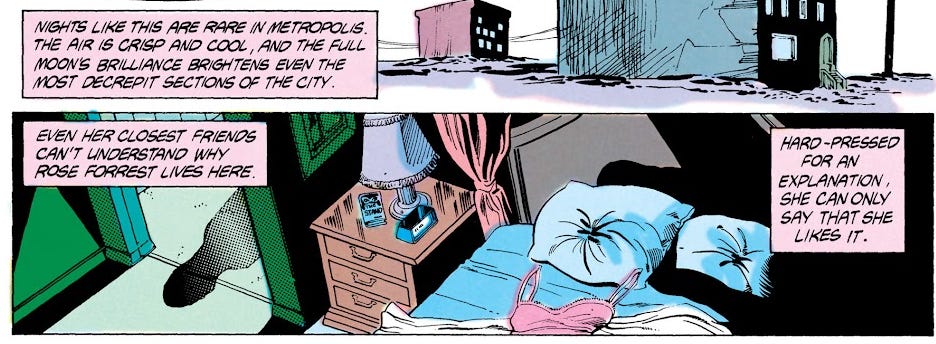
I can’t really say I have much of an opinion on Rose aka Thorn aka ‘this is not actually how mental illness works’. She’s just sort of there. She’s not particularly compelling. Every single character has at least one fan out there who loves them, but I’m hard-pressed to imagine you can count hers on more than a single hand, anyway. The general sense you get by her appearance is that either Dan’s a fan of the most obscure possible characters or this was just the only established one he was gonna be allowed to use.
Personally, I’m banking on the second.
After we meet Rose’s lingerie, anyway, we head back to Goldstar, Inc., where poor Trixie is trying to make a clean getaway after what is apparently a ridiculously long day, only to run into Dirk “The Mustache is Only Where the Douchery Starts” Davis and a surprisingly cool and not-at-all-devastated Booster, lending further credence to the idea Booster’s already got the situation mostly worked out and is therefore just biding his time.
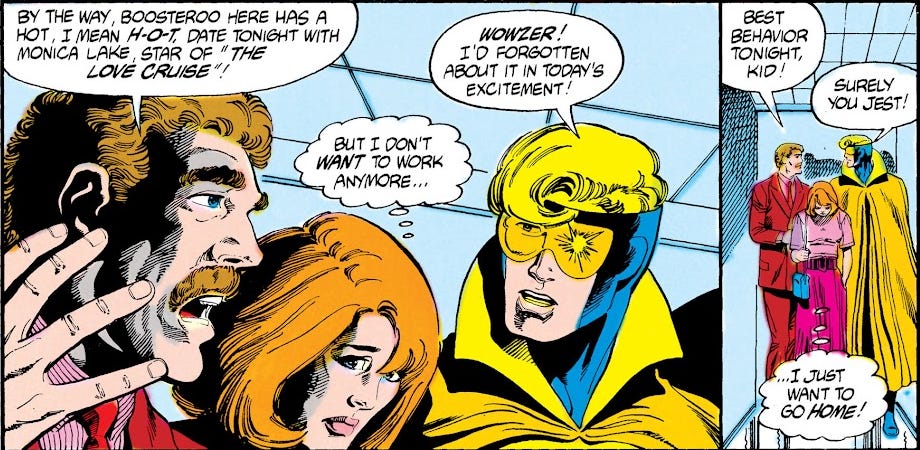
Somehow, though, he completely forgot about the supposedly hot date he was going to have with an actual, presumably beautiful television star; this is, of course, exactly what you would expect a young, hot-blooded, ostensibly heterosexual guy to do— right?
As if that wasn’t enough, you have what Booster wears to this seriously ‘hot’ date: A purple tuxedo jacket overtop his costume with a bowtie almost as big as his head and ruffled fricken cuffs. The Purple Rain jokes are intensely self-evident, but Booster’s fashion sense is emphatically not. I refuse to believe a man that beautiful has such tragic tastes after spending months in the past and instead will posit the theory that he’s actually not interested in this date at all and that literally everything he does through this whole thing is an act, including those godawful clothes.
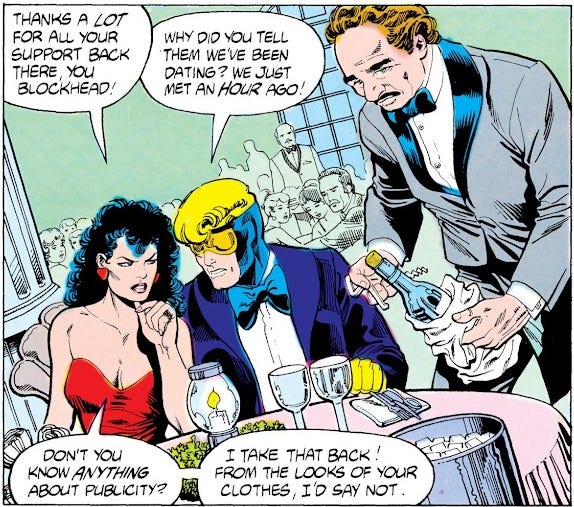
And I mean, there’s a lot to be said for that interpretation, because Booster’s very clearly not into this. Not even a little bit. Nor do I blame him, because Monica there is certainly an asshole; as to whether Booster understands publicity, that’s a very interesting question and another entire psych/soc dissertation waiting in the wings.
(Even in the most generous reading you’ve got, Booster’s got enough understanding of publicity to market himself to pay the bills, as he pragmatically stated last issue. He also somehow managed to slip past his manager dressed like that, which you know Dirk would have never allowed if he’d seen it. And finally, how he acts for the rest of this date very strongly suggests that he is — essentially — trolling the hell out of Monica Lake deliberately.)
Beyond the fact he’s showing no signs of enjoying himself, his swift disdain for his date and his casual bald-faced lying (about where his powers come from) round out the picture. I thought I’d reread this scene wanting to smack him for being boorish, because he is acting very boorish, but the more I really contemplate it, the more convinced I am that Booster’s behavior here is calculated and deliberate: He not only wanted this date to bomb, he did everything in his power to make it bomb— and, in truly Booster-fashion, in the campiest possible way.
(The only thing more entertaining than that realization is imagining Dirk’s face as he rapidly experiences every single stage of grief at once over the media coverage.)
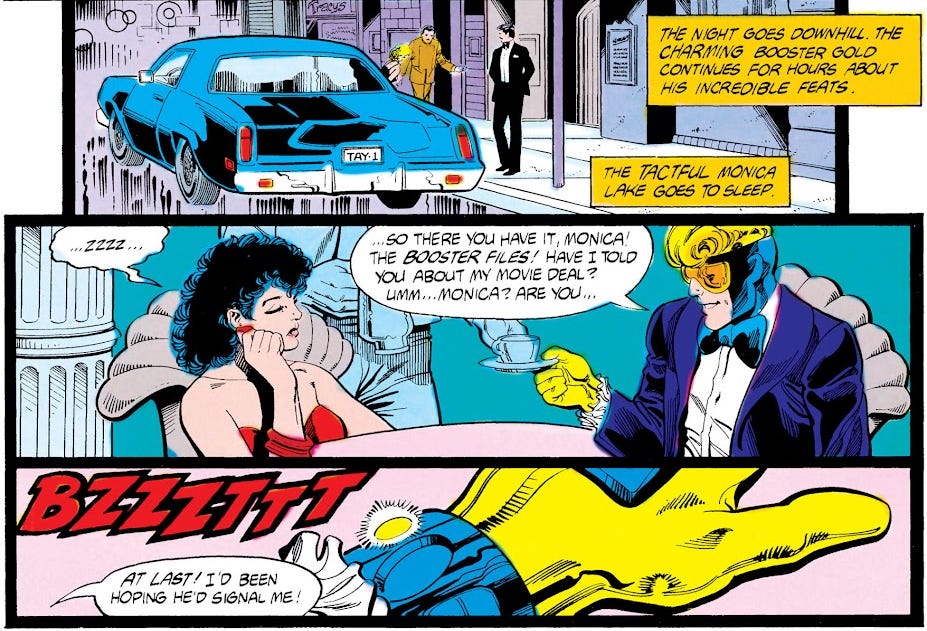
I’m entertained by Dan’s dry wit on display in the narrative there. Dan clearly doesn’t like Monica any more than Booster does, so no one makes it out of this scene completely unscathed. And then, finally, Booster is rescued by a mysterious call that he very obviously had been anticipating, which is kind of the final nail in the coffin for any assumption that this date had been in any way sincere, at least on Booster’s part.
The speed with which he takes off has got to be quite an insult; at least, that’s how Monica takes it, her internal monologue a good reminder that Booster’s secondary cast, with very few exceptions, happens to be made up of actual scum. It also made me laugh legit, Booster bolting with a, “You’ll be fine! Bye!” and stiffing her with the bill. Like damn, my dude, don’t hold back any on your absolutely understandable but still over-the-top dislike of her.
He blows by Senator Ballard on his way to the roof — so we don’t forget that the number of people lining up to put Booster’s head on a pike are stretched around the block like the opening night of a Broadway musical — and then Booster’s mercifully free of all this farce.
That all gives way to the best (and most sincere) page of this particular issue:
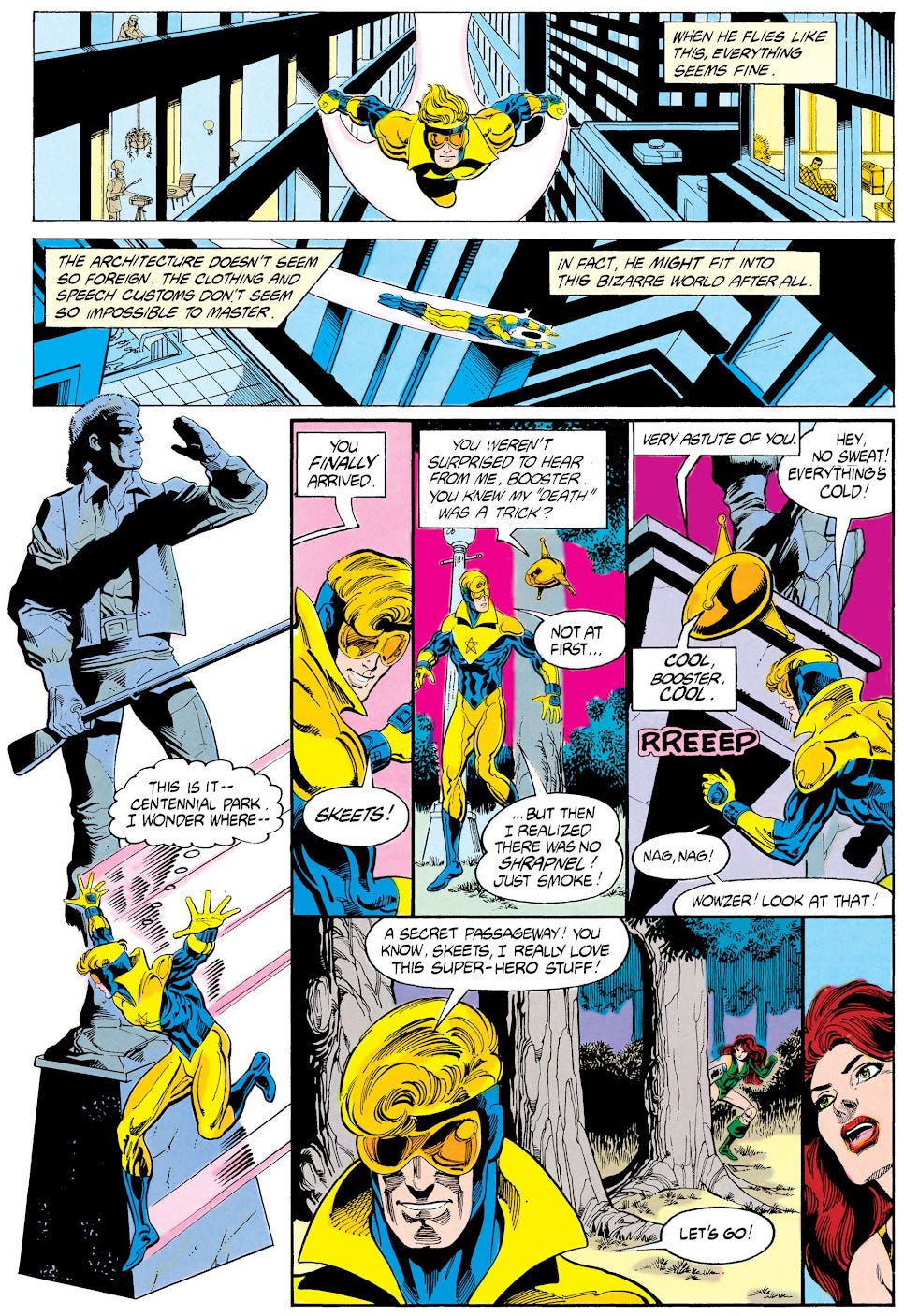
The pivot from the artifice of that date to the actual sweetness of the narrative here is excellent. In just a couple pages, Dan does a very nice job continuing to delineate what of his creation is the public mask and what is the actual reality. And when there’s no one he’s performing for and no one he’s protecting himself from, Booster’s so earnest that it’s almost painful. The kid has the canny survival skills of someone who didn’t make it out of childhood clean and unscathed, but if you told me after reading this page that he used to tie bath towels around his neck and play superhero when he was little, like so many kids do, I would have no trouble at all believing it. You can see a precise and achingly darling echo of a million childhoods here.
It also manages to serve two other purposes in a compressed space: It reunites Booster and Skeets (and Booster’s relief at said reuniting is practically tangible from here on) and it reminds us of the vulnerability inherent in being as alone as Booster really is in this time, but for his ‘bot.
After that lovely little exchange, we go glance at Trixie and her home situation, which brings me back around to why I said earlier that she’s only a partial exception to the rule about the number of people who want a piece of Booster Gold.
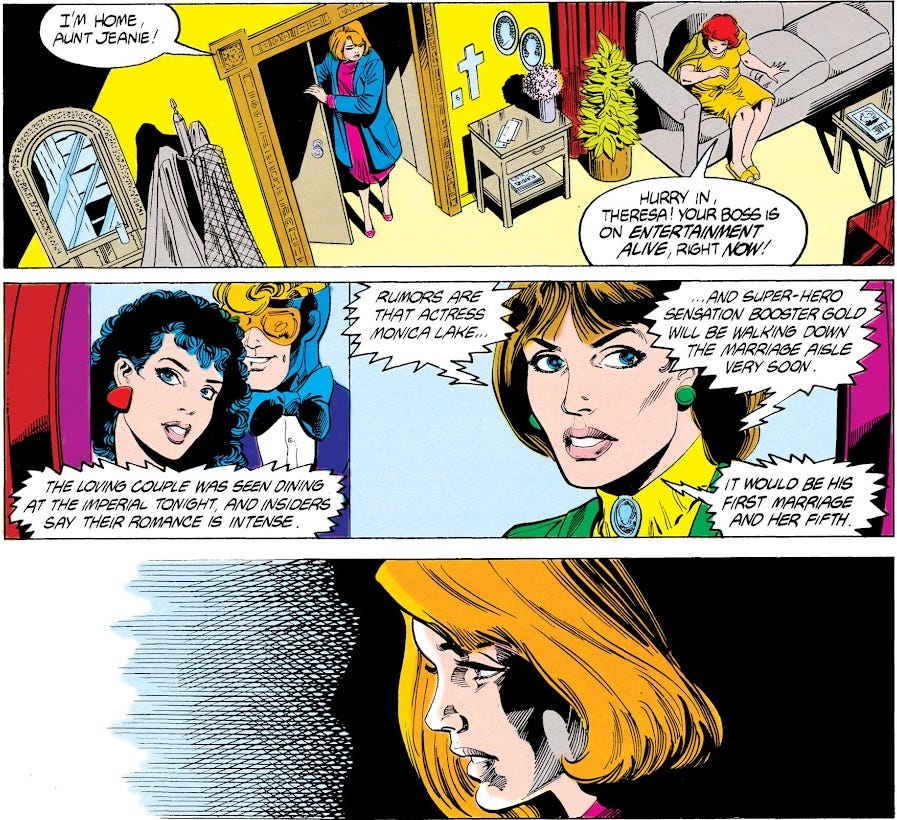
I’m going to get more into this probably when it becomes more relevant, but I will say that out of the gate, it’s in Trixie (versus how Monica is written) that you get the feeling you’re more seeing what young Dan’s ideal of a nice girl is and less an invocation of a real live girl with real motivations and feelings. She’s pretty, virtuous, Midwestern, dresses modestly, her aunt has a cross hanging on the wall and by god, you just know she grew up going to church in Kansas, and probably she wore patent leather shoes and cute Sunday dresses when she did. She is definitely not that coastal trash on the television with her direly-dressed crush boss.
I don’t want you to get the impression I don’t like Trixie at all. But even here, in the third issue, her role as wholesome ‘man-saver/scold/redeemer’ is being set up and that’s never, ever a good position for a female character to be in. Not as anything but a cautionary tale, anyway. I think it would be more palatable if Dan didn’t shove her right back into that role in Blue & Gold over thirty years later, the only concession to her being a modern woman in her changing her nickname to Terri from Trixie; otherwise, though, she’s right back to trying to fix him (or save him), and whoooooo boy, that’s not fair to either of them, in narrative or in-universe.
It’s another of those interesting intersections and divergences of Watsonian vs. Doylist thinking, anyway. You can sort of see where Dan might have meant a parallel between both of these young fish out of water — one from Kansas in the big city, one from five centuries in the future — but given how he characterizes just about every woman who isn’t Trixie or isn’t Michelle (and she doesn’t count, this isn’t GoT here) in this book, the subconscious sexism rears its head again; not even Trixie escapes the whole Madonna-Whore Dichotomy (as in the feminist discussion, not the Freudian one) and, in fact, seems to all but created to fulfill half of it.
There’s a lot more to all this, though, and this review’s already got one hefty digression, so— onward!
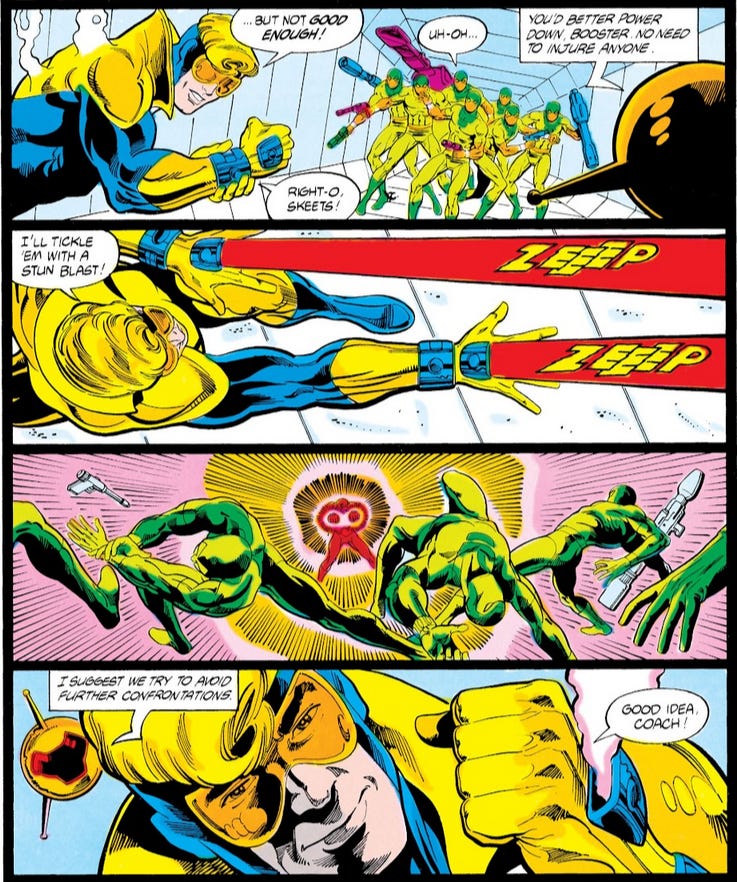
After some back-and-forth fire exchange, Booster decides they’re gonna do the unexpected—
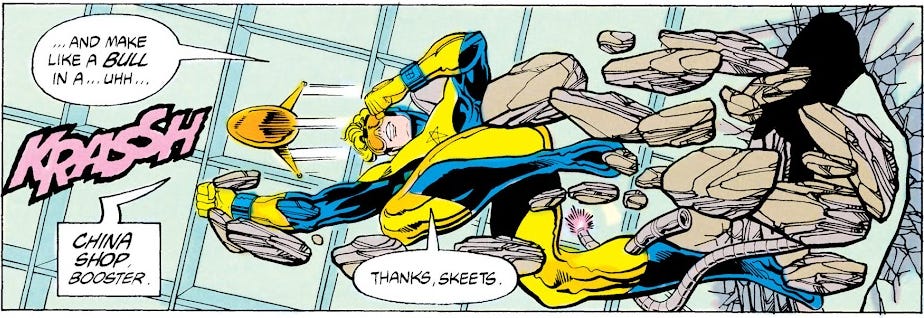
— which does not actually end up working out all too well in the long run, but give them points for the effort. After a little more action and adventure, though, Mindancer decides she’s gonna deal with our boy and goes to do that, which leads to whoa shit body-count!
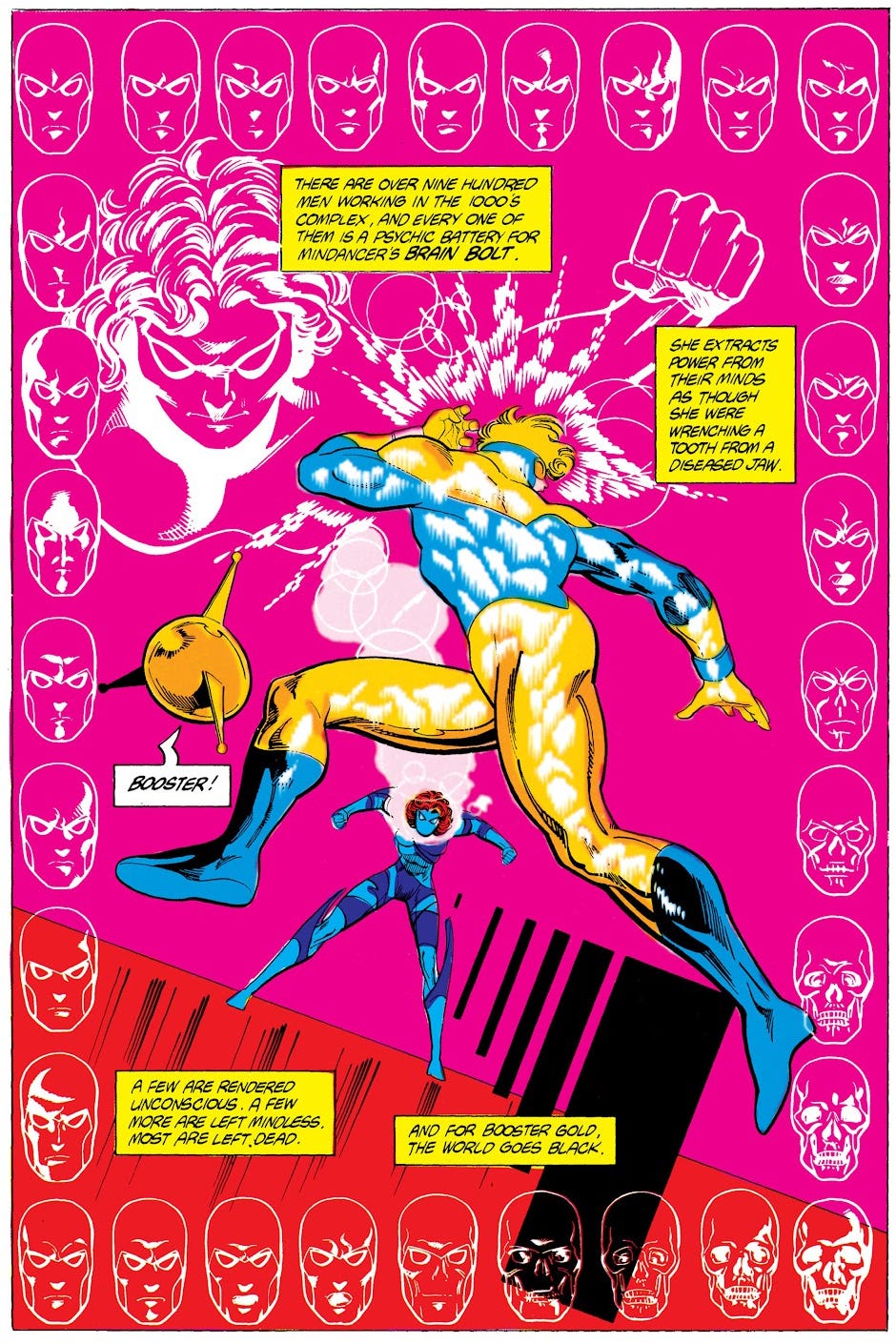
After that brightly colored and yet disturbingly deadly page, a mass casualty situation we kinda never address, we skip over to some tool named Myron. In fairness, with a name like Myron, he couldn’t not be a tool, he was predestined for such things, but I will say that Dan’s cynical little aside about fractional children at the top of the scene made me giggle:

We find out that Ballard’s the dude with the bitchin’ cane from last issue, which isn’t actually a surprise, and that he plans on moving against Booster and Booster’s company. Given who he turns out being, this is a fun little misdirect, albeit brief, and then we skip back to where our hero is waking up from the psychic migraine that Mindancer no doubt gave him, only to find Skeets-in-a-box and he himself trussed up spread-eagle with his suitor nemesis from the previous two issues: Blackguard.
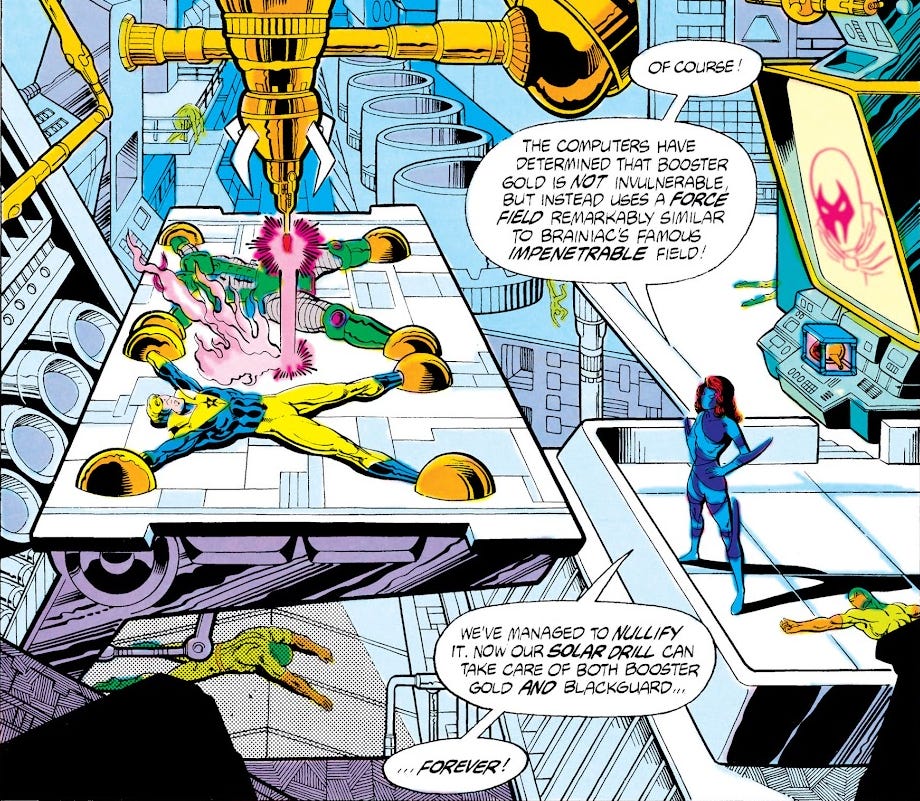
The issue leaves off here with the next cliffhanger — as is becoming habit for this book! — and a teaser that it’s only going to involve some manner of crash.
Walter rates this one at ⭐⭐⭐⭐ out of five. I think that’s being pretty generous, but I do have to admit that his primary reasoning — our boy’s absolutely atrocious clothes on his ‘date’ — is truly flawless. If you’re gonna give it an extra star, the purple jacket, ruffles and black bowtie are so bad they deserve it. I do believe it’s the last time we ever see Booster dressed so badly (absent his post-Doomsday armor), and I think he really did do it deliberately.
For me, my favorite page was the one where we got a little of Booster’s internal narrative, his reuniting with his ‘bot, and his adorable enthusiasm for this superhero stuff. Both for the reminder of myself around that age — thinking I knew more than I did, trying to project maturity I hadn’t yet earned, but still starry-eyed and achingly earnest when I was safe to be — and for those same things I can still sometimes see in my mostly-grown children now.
The Final Tally
Urge to Slap Booster Silly: 4
Urge to Coo Over Booster: 7
Give Skeets a Medal: 5
Give Trixie a Medal: 4
Booster in Bondage: 2
Urge to Wrap Booster in Soft Blankets: 2
Stay tuned for what comes next: Ted’s fourth issue and maybe even Green Lantern #59! Then, after that, Booster Gold (1986) #4.
And thanks for being patient and waiting for this. Hopefully once I finish settling into this new job, things will go back to moving apace!
1 Unless we presume Booster is intentionally acting both boorish and straight, in which case, someone give that boy an Oscar! I actually can make a very credible case from here on out for both of those being nothing more than an act, too.
2 If there are any songwriters out there, I’d love a version of this set to the same music as Actual Cannibal Shia LaBeouf.
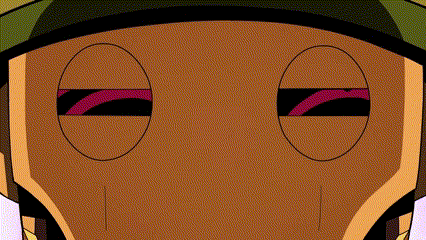
4 The whole ‘blackmailed by the mob’ bit in ‘89 was Dan’s writing, so kudos to the man there, too; Mark Waid later rehashed it in ‘93 in JLQ #10. Even more interesting about that is that Booster tells Ted about the blackmail in ‘89, but not his team as a whole in ‘93, choosing to leave out that pretty critical piece of information; he skips right from his mother’s illness to him getting caught up in the money. Further, from the dialogue in that issue of JLQ, it’s pretty clear he hadn’t ever told the rest of them the whole sordid tale before that point; he’s been teammates with them for years by that point.





